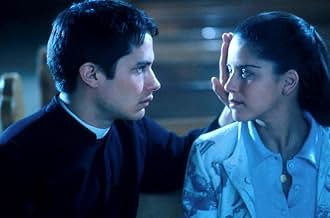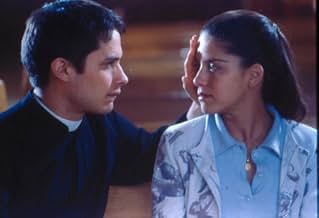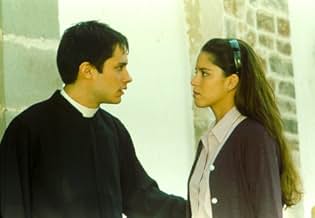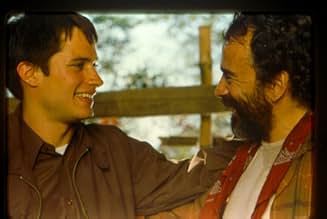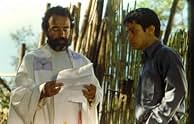IMDb-BEWERTUNG
6,7/10
14.818
IHRE BEWERTUNG
Füge eine Handlung in deiner Sprache hinzuPolitics and sexual passions threaten to corrupt a young, newly-ordained priest in a small Mexican town.Politics and sexual passions threaten to corrupt a young, newly-ordained priest in a small Mexican town.Politics and sexual passions threaten to corrupt a young, newly-ordained priest in a small Mexican town.
- Regie
- Drehbuch
- Hauptbesetzung
- Für 1 Oscar nominiert
- 21 Gewinne & 15 Nominierungen insgesamt
Pedro Armendáriz Jr.
- Presidente Municipal Gordo
- (as Pedro Armendáriz)
Empfohlene Bewertungen
The release of the film THE CRIME OF PADRE AMARO caused about as much of an uproar in Mexico in 2002 as the publication of the novel, written by Jose Maria Eca de Queiroz, caused in 1875. With its dangerously intertwining themes of spiritual ecstasy and sexual passion, it's not hard to see why. At the heart of the story is a young priest who wrestles in a major way with the tempting hungers of his body and the grace-filled yearnings of his spirit. It does not help that, to pursue his vocation, he is sent to a town sustained by a culture of corruption.
One thing actor Gael Garcia Bernal does not know how to do is give a bad performance, and in the movie's title role he captures brilliantly all the agonizing ambiguity that comes with being a young adult male intent on asserting his masculinity while also serving the spiritual needs of his community. Unfortunately, his happily deluded demeanor meets with an equally intense personality in the form of Amelia, a devout young devotee acted with mesmerizing perfection by the gorgeous Ana Claudia Talancon. Amelia idolizes the young priest as a true and noble holy man whose sexuality is made sacred by his presumably pure soul. He in turn dares to drape her in a cape reserved for representations of the Madonna and recites to her from Solomon's "Song of Songs" as they seduce each other. Controversial? Better believe it.
As in the film THE HEALER (please see companion review) "The Crime of Padre Amaro" depicts sexuality and spirituality as equally powerful forces of attraction capable of producing very different results, which will not be revealed here. The outcome in "The Crime of Padre Amaro" is shocking in more ways than one and well worth contemplating for a long time.
by Author-Poet Aberjhani, author of "Christmas When Music Almost Killed the World"
One thing actor Gael Garcia Bernal does not know how to do is give a bad performance, and in the movie's title role he captures brilliantly all the agonizing ambiguity that comes with being a young adult male intent on asserting his masculinity while also serving the spiritual needs of his community. Unfortunately, his happily deluded demeanor meets with an equally intense personality in the form of Amelia, a devout young devotee acted with mesmerizing perfection by the gorgeous Ana Claudia Talancon. Amelia idolizes the young priest as a true and noble holy man whose sexuality is made sacred by his presumably pure soul. He in turn dares to drape her in a cape reserved for representations of the Madonna and recites to her from Solomon's "Song of Songs" as they seduce each other. Controversial? Better believe it.
As in the film THE HEALER (please see companion review) "The Crime of Padre Amaro" depicts sexuality and spirituality as equally powerful forces of attraction capable of producing very different results, which will not be revealed here. The outcome in "The Crime of Padre Amaro" is shocking in more ways than one and well worth contemplating for a long time.
by Author-Poet Aberjhani, author of "Christmas When Music Almost Killed the World"
I enjoyed this movie, not because it was gripping or exciting, but because of what it had to say.
I'm not completely aware of everything to do with the Catholic Church, but the controversy in this movie is a necessary one.
I've never seen a Gael Garcia movie before and I thought this was good. The most powerful part of the movie is what it leaves you with - the message at the end; the themes of confession, of sin, of mistakes, of being human.
If you can't watch something that is quite slow and is not edge of the seat stuff, then forget it. Even the music isn't very memorable. But the movie stuck in my mind.
I'm not completely aware of everything to do with the Catholic Church, but the controversy in this movie is a necessary one.
I've never seen a Gael Garcia movie before and I thought this was good. The most powerful part of the movie is what it leaves you with - the message at the end; the themes of confession, of sin, of mistakes, of being human.
If you can't watch something that is quite slow and is not edge of the seat stuff, then forget it. Even the music isn't very memorable. But the movie stuck in my mind.
`El Crimen' was not a bad film, although it was hardly worthy of accolades. While the acting was passable, the story did not move along in a provocative enough manner to thoroughly captivate its audience-- in simple terms, the movie was somewhat slow.
What is interesting to notice is the reaction that the public-- especially the Catholic public-- has had to this film. As a Catholic, it saddens me to see the amazing amount of rage focused around the lust of the film's central character, Padre Amaro. The film, on a superficial level, was rebellion against stale relics of Catholic tradition-- such as requisite chastity for clergy and the deification of inanimate objects-- that may well spell the end of the faith if they are not shed. It is on these superficial levels that Padre Amaro is decried as a criminal of the faith by the viewing public, but lust is not this priest's true crime.
Central to the film's controversy is the corruption that propels the church. The truest crime of the film is the web of cover-ups and lies that the church creates in order to propagate its cause. The church is held deep in the pockets of the drug cartel and in order to maintain their stability, the majority of the church leadership, from the bishop down to the sacristans,
are quite comfortable with, at worst, lying and falsifying evidence or, at best, looking the other way. The crime of Padre Amaro is not so much that he acted upon his human impulses as that he accepts the corruption of the church by participating in its lies and creating lies of his own.
Unfortunately, this film's only exposé is not the corruption of the church, which has become more and more evident in recent times, but the faithful church body's willingness to pretend that none of this goes on. One of the most terrifyingly ironic cries of foul against this film, as evidenced in many of these reviews, is, `Priests would never act that way!' How can one, in today's climate, make such assertions? While this film should, in an ideal world, be objectionable, the current outcry by supposedly devout Catholics represents a denial of epidemic proportions.
If one would set aside one's group think for two hours while watching this film, one might gain a perspective of the church that our priests do not offer in their Sunday morning Masses. This film may not represent what we would like our church to be, but it does represent what our church is. If we continue to pretend that the current state of affairs of our faith is acceptable, then el crimen de Padre Amaro will also be our crime: complacence.
What is interesting to notice is the reaction that the public-- especially the Catholic public-- has had to this film. As a Catholic, it saddens me to see the amazing amount of rage focused around the lust of the film's central character, Padre Amaro. The film, on a superficial level, was rebellion against stale relics of Catholic tradition-- such as requisite chastity for clergy and the deification of inanimate objects-- that may well spell the end of the faith if they are not shed. It is on these superficial levels that Padre Amaro is decried as a criminal of the faith by the viewing public, but lust is not this priest's true crime.
Central to the film's controversy is the corruption that propels the church. The truest crime of the film is the web of cover-ups and lies that the church creates in order to propagate its cause. The church is held deep in the pockets of the drug cartel and in order to maintain their stability, the majority of the church leadership, from the bishop down to the sacristans,
are quite comfortable with, at worst, lying and falsifying evidence or, at best, looking the other way. The crime of Padre Amaro is not so much that he acted upon his human impulses as that he accepts the corruption of the church by participating in its lies and creating lies of his own.
Unfortunately, this film's only exposé is not the corruption of the church, which has become more and more evident in recent times, but the faithful church body's willingness to pretend that none of this goes on. One of the most terrifyingly ironic cries of foul against this film, as evidenced in many of these reviews, is, `Priests would never act that way!' How can one, in today's climate, make such assertions? While this film should, in an ideal world, be objectionable, the current outcry by supposedly devout Catholics represents a denial of epidemic proportions.
If one would set aside one's group think for two hours while watching this film, one might gain a perspective of the church that our priests do not offer in their Sunday morning Masses. This film may not represent what we would like our church to be, but it does represent what our church is. If we continue to pretend that the current state of affairs of our faith is acceptable, then el crimen de Padre Amaro will also be our crime: complacence.
From a novel by the 19th century Portuguese well-known novelist Eça de Queirós, the Mexican director Carlos Carrera made this good movie in which to the main ingredients present at all times everywhere (lust, the temptations of the flesh haunting Catholic priests, religious hypocrisy, love and bourgeois prejudices) he added specific Mexican ones of our times such as the fight for independent journalism, drug traffic, complicity of authorities and the fight of the peasants for dignity, freedom and a better life. He was very successful in telling the same story contained in the Portuguese novel, transposing it from the atmosphere of a Portuguese provincial town in the second half of 19th century to rural Mexico of present times. The acting of all performers is sober and efficient with special prominence to Ana Claudia in the role of the sensual nymphet who seduces the young priest not with great difficulty it must be said.
Crimen del Padre Amaro
The film Crimen del Padre Amaro is set in Los Reyes, Mexico in 2002. In Mexico by 2002, a continuing economic, political, and social crisis was spiraling deeper and deeper. The chaos was caused by a debt problem and the system of dependent capitalism the debt produced. "Between 1994 and 2000 average wages declined 21 percent" (Keen 317). By 2002, Mexico had become more and more dependent primarily upon the United States, its foreign export, and its investment-capital markets. Despite these setbacks, Mexicans always had something to fall back upon and to look to for support: the Catholic Church.
The Catholic Church is the main focus in the movie Crimen del Padre Amaro. There are no specific events that occurred within the movie that occurred in real Mexican history; however the events that do occur are believable and likely happened. Within the film, Padre Benito is taking money donations from a local drug lord to help fund a new hospital. Since there are many drug lords in Mexico it is not unbelievable that two of the most powerful groups in Mexico are the drug lords and the Church officials. It makes sense that they would overlap at some point, however I am sure that this scenario does not occur in all areas of Mexico. The director could have made it a little clearer that the drug lord was an actual drug lord; it was a little confusing with the mayor and the drug lord to keep each person separate. Another point of corruption within the Church is the fact that both Padre Benito and Padre Amaro have sexual relations with females despite their celibacy vows. This is not surprising at all, since it has become public knowledge that many Catholic priests have had sexual relations with people in recent years. The director could have shown more of the economic crisis and guerrilla warfare situations more, because they were a little confusing if one did not know or look into what was going on in Mexico in 2002.
The film is well made and attention-grabbing. The plot is a little confusing at first, as most movies are, however it all becomes much clearer and focused as the movie continues. In the beginning of the movie, Padre Amaro is seen as the good guy, who everyone wanted to succeed; however, by the end of the film, I looked upon Padre Amaro with complete disgust. Ironically, Padre Benito, I felt, was a horrible, corrupt priest in the beginning, and by the end I liked him much more than ever before. Padre Amaro was so young and yet he ended up being the most selfish and corrupt of all the priests in the community. Crimen del Padre Amaro is a very interesting film that is entertaining and worth watching to see what modern-day rural Mexico is like.
The film Crimen del Padre Amaro shows an interesting outlook of the Catholic Church and the corruption that exists within the Church in Mexico. It is very gripping and definitely worth watching. Although there are parts that can be confusing, it is fascinating to see how rural and "backward" parts of Mexican life can be. I would recommend viewing this movie and on a scale of 1-10, I would give it a 7.
Works Cited: Keen, Benjamin and Keith Haynes: A History of Latin America. New York: Houghton Mifflin Company, 2004.
The film Crimen del Padre Amaro is set in Los Reyes, Mexico in 2002. In Mexico by 2002, a continuing economic, political, and social crisis was spiraling deeper and deeper. The chaos was caused by a debt problem and the system of dependent capitalism the debt produced. "Between 1994 and 2000 average wages declined 21 percent" (Keen 317). By 2002, Mexico had become more and more dependent primarily upon the United States, its foreign export, and its investment-capital markets. Despite these setbacks, Mexicans always had something to fall back upon and to look to for support: the Catholic Church.
The Catholic Church is the main focus in the movie Crimen del Padre Amaro. There are no specific events that occurred within the movie that occurred in real Mexican history; however the events that do occur are believable and likely happened. Within the film, Padre Benito is taking money donations from a local drug lord to help fund a new hospital. Since there are many drug lords in Mexico it is not unbelievable that two of the most powerful groups in Mexico are the drug lords and the Church officials. It makes sense that they would overlap at some point, however I am sure that this scenario does not occur in all areas of Mexico. The director could have made it a little clearer that the drug lord was an actual drug lord; it was a little confusing with the mayor and the drug lord to keep each person separate. Another point of corruption within the Church is the fact that both Padre Benito and Padre Amaro have sexual relations with females despite their celibacy vows. This is not surprising at all, since it has become public knowledge that many Catholic priests have had sexual relations with people in recent years. The director could have shown more of the economic crisis and guerrilla warfare situations more, because they were a little confusing if one did not know or look into what was going on in Mexico in 2002.
The film is well made and attention-grabbing. The plot is a little confusing at first, as most movies are, however it all becomes much clearer and focused as the movie continues. In the beginning of the movie, Padre Amaro is seen as the good guy, who everyone wanted to succeed; however, by the end of the film, I looked upon Padre Amaro with complete disgust. Ironically, Padre Benito, I felt, was a horrible, corrupt priest in the beginning, and by the end I liked him much more than ever before. Padre Amaro was so young and yet he ended up being the most selfish and corrupt of all the priests in the community. Crimen del Padre Amaro is a very interesting film that is entertaining and worth watching to see what modern-day rural Mexico is like.
The film Crimen del Padre Amaro shows an interesting outlook of the Catholic Church and the corruption that exists within the Church in Mexico. It is very gripping and definitely worth watching. Although there are parts that can be confusing, it is fascinating to see how rural and "backward" parts of Mexican life can be. I would recommend viewing this movie and on a scale of 1-10, I would give it a 7.
Works Cited: Keen, Benjamin and Keith Haynes: A History of Latin America. New York: Houghton Mifflin Company, 2004.
Wusstest du schon
- WissenswertesThis movie began creating controversy even before it was released. Several groups, most of them related to the church, tried to ban it. They did not succeed; instead, tickets were sold out on opening weekend.
- PatzerAmaro gets beaten up by Ruben and receives some bruises in his face. A little later, when he meets Amelia in the church, the bruises are gone.
- Zitate
Father Amaro: Tell me your sins, child.
Amelia: You already know them. And your sins?
- Crazy Credits"In memoriam Paco Rabal"
- VerbindungenFeatured in The 60th Annual Golden Globe Awards (2003)
Top-Auswahl
Melde dich zum Bewerten an und greife auf die Watchlist für personalisierte Empfehlungen zu.
- How long is The Crime of Padre Amaro?Powered by Alexa
Details
- Erscheinungsdatum
- Herkunftsländer
- Offizielle Standorte
- Sprache
- Auch bekannt als
- The Crime of Padre Amaro
- Drehorte
- Produktionsfirmen
- Weitere beteiligte Unternehmen bei IMDbPro anzeigen
Box Office
- Budget
- 1.800.000 $ (geschätzt)
- Bruttoertrag in den USA und Kanada
- 5.717.044 $
- Eröffnungswochenende in den USA und in Kanada
- 504.681 $
- 17. Nov. 2002
- Weltweiter Bruttoertrag
- 26.996.738 $
- Laufzeit
- 1 Std. 58 Min.(118 min)
- Farbe
- Sound-Mix
- Seitenverhältnis
- 1.85 : 1
Zu dieser Seite beitragen
Bearbeitung vorschlagen oder fehlenden Inhalt hinzufügen







